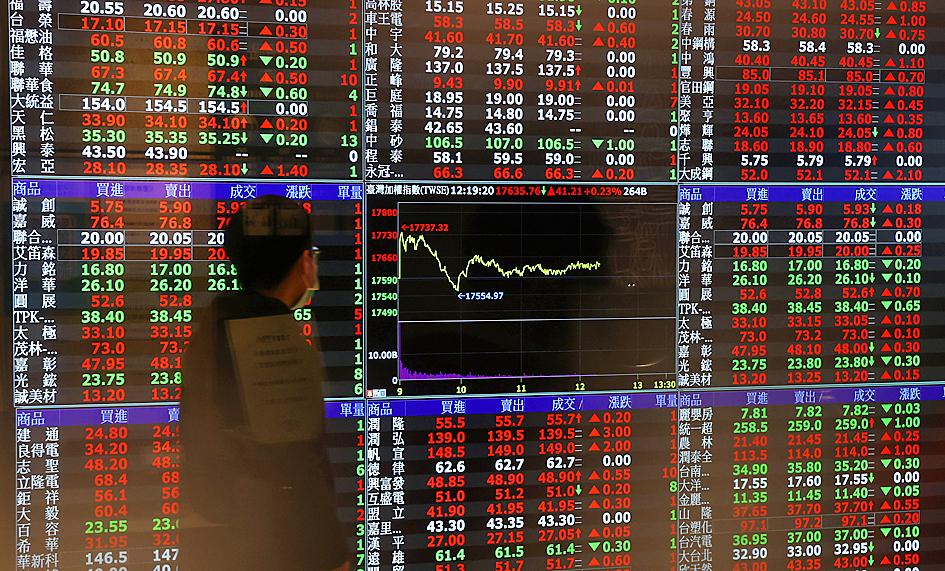Russia’s invasion of Ukraine has disrupted the bullish momentum in financial stocks, while the pace of US Federal Reserve interest rate increases and global supply chains adapting to the post-COVID-19 period is expected to continue to affect Taiwanese equities, Allianz Global Investors Taiwan Ltd (安聯投信) said on Friday.
“Concerns over default on Russian sovereign debt and expectations of a slower pace of Fed interest rate adjustments [in light of the Ukraine-Russia war] are unfavorable for the performance of financial stocks,” the company’s Taiwan equity research team said in a note.
Taiwan Stock Exchange (TWSE) data showed that the main bourse’s financial and insurance subindex retreated 3.03 percent last week, reflecting the poor performance of financial sector shares.

Photo: CNA
The exposure of Taiwanese banks, insurers, securities firms and individual investors to the Ukrainian and Russian markets totaled NT$217.9 billion (US$7.78 billion) as of the end of last month, the Financial Supervisory Commission said on Friday.
The nation’s exposure to the two markets was relatively small compared with other countries, the agency said.
As for electronics stocks, Allianz strategists said that the market remains worried about potential adverse effects of supply-demand changes on price and inventory adjustments.
The short-term performance of stocks in the sector largely depends on the respective company’s financial results for the fourth quarter of last year, they said.
So far, traditional industry stocks seem to be safer bets, with investors moving more assets to the sector, Allianz said, adding that stocks of firms in the transportation and steel sectors are performing better than other traditional industry stocks.
The strategists said that in volatile times, investors increasingly favor stocks with medium to long-term growth potential, such as in the high-performance computing, artificial intelligence, servers and electric vehicle sectors.
Shares of semiconductor companies with higher order visibility might also benefit, as investors’ worries over slim inventory have made the stocks quite cheap, Allianz said.
The strategists’ advice came after the TAIEX on Friday closed 0.33 percent higher at 17,652.18 points on a technical rebound, following a 2.55 percent fall in the previous session.
The TAIEX dropped 3.18 percent for the whole of last week, while it has so far this year retreated 3.11 percent, TWSE data showed.
Foreign institutional investors continued to stand on the sell side to unload local equities on Friday, selling a net NT$51.03 billion of shares on the main board, TWSE data showed.
In the week, foreign institutional investors sold a net NT$166.54 billion of local shares after selling a net NT$6.31 billion a week earlier, the exchange's data showed.
The most actively traded stocks last week were semiconductor shares with a total turnover of NT$492 billion, followed by shipping stocks at NT$455.5 billion and electronic component stocks at NT$145 billion, the data showed.
Additional reporting by Kao Shih-ching

SEEKING CLARITY: Washington should not adopt measures that create uncertainties for ‘existing semiconductor investments,’ TSMC said referring to its US$165 billion in the US Taiwan Semiconductor Manufacturing Co (TSMC, 台積電) told the US that any future tariffs on Taiwanese semiconductors could reduce demand for chips and derail its pledge to increase its investment in Arizona. “New import restrictions could jeopardize current US leadership in the competitive technology industry and create uncertainties for many committed semiconductor capital projects in the US, including TSMC Arizona’s significant investment plan in Phoenix,” the chipmaker wrote in a letter to the US Department of Commerce. TSMC issued the warning in response to a solicitation for comments by the department on a possible tariff on semiconductor imports by US President Donald Trump’s

The government has launched a three-pronged strategy to attract local and international talent, aiming to position Taiwan as a new global hub following Nvidia Corp’s announcement that it has chosen Taipei as the site of its Taiwan headquarters. Nvidia cofounder and CEO Jensen Huang (黃仁勳) on Monday last week announced during his keynote speech at the Computex trade show in Taipei that the Nvidia Constellation, the company’s planned Taiwan headquarters, would be located in the Beitou-Shilin Technology Park (北投士林科技園區) in Taipei. Huang’s decision to establish a base in Taiwan is “primarily due to Taiwan’s talent pool and its strength in the semiconductor

An earnings report from semiconductor giant and artificial intelligence (AI) bellwether Nvidia Corp takes center stage for Wall Street this week, as stocks hit a speed bump of worries over US federal deficits driving up Treasury yields. US equities pulled back last week after a torrid rally, as investors turned their attention to tax and spending legislation poised to swell the US government’s US$36 trillion in debt. Long-dated US Treasury yields rose amid the fiscal worries, with the 30-year yield topping 5 percent and hitting its highest level since late 2023. Stocks were dealt another blow on Friday when US President Donald

UNCERTAINTY: Investors remain worried that trade negotiations with Washington could go poorly, given Trump’s inconsistency on tariffs in his second term, experts said The consumer confidence index this month fell for a ninth consecutive month to its lowest level in 13 months, as global trade uncertainties and tariff risks cloud Taiwan’s economic outlook, a survey released yesterday by National Central University found. The biggest decline came from the timing for stock investments, which plunged 11.82 points to 26.82, underscoring bleak investor confidence, it said. “Although the TAIEX reclaimed the 21,000-point mark after the US and China agreed to bury the hatchet for 90 days, investors remain worried that the situation would turn sour later,” said Dachrahn Wu (吳大任), director of the university’s Research Center for